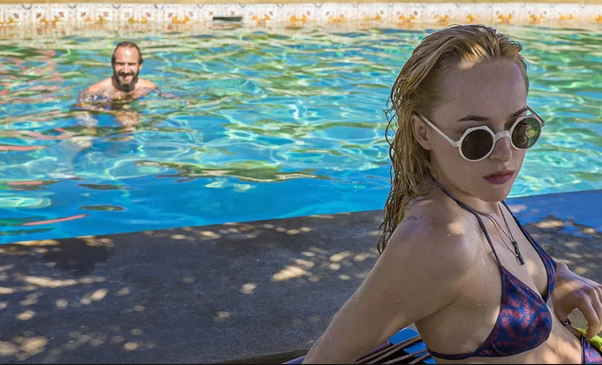Though director Luca Guadagnino has been with us since the late 90s, it’s only since 2009’s I Am Love that the Italian rival to Paolo Sorrentino has been steadily building on both his critical and American audience interest. With his latest, A Bigger Splash, the director continues to prove his camp sensibilities by mere employment of Dakota Johnson as Penelope Lannier. Indeed, it is often she who ignites the screen with her electricity over Tilda Swinton as aging rock star Marianne Lane, who has sequestered herself in a palatial (by Italian standards) home near Sicily to recover from surgery on her ailing vocal chords. There to care for her is her lover of six years, documentarian Paul De Smedt (Matthias Schoenaerts), who is both surprised and irked to find their idyllic state of existence interrupted by music producer Harry Hawkes’ (Ralph Fiennes) arrival on the island with his daughter, Penelope (though she would like to get a paternity test for “personal reasons” a.k.a. she wants to have sex with him).
The duo have come from Rome, where Harry learned of Marianne’s whereabouts on Pantelleria in the Strait of Sicily, and decided to pop in for a visit, in spite of the uncomfortable fact that the two also used to be intimately involved–also for six years. Pen (as Penelope is called) mentions this numerical connection casually to Marianne by noting that records used to have six songs on each side to entice people to keep turning the record over repeatedly, an obvious allusion to what everyone is expecting Marianne to do with Harry.
Apart from the sumptuous visuals easily provided by Sicilian scenery, food and culture, there is a sordidness lingering beneath every scene–but then is that not to be expected when there’s a Fifty Shades of Grey tie? The understated references to biblical imagery, primarily the proverbial snakes in the grass that keep coming toward Marianne and Paul’s property, are accented by Pen’s Eve-like nature, tempting men with the apple that is her overt sexuality. The one she tempts in particular is Paul, coercing him into going on a hike with her after swimming provocatively in front of him in the pool that so often serves as the focal point of the film.
Meanwhile, the tension between Harry and Marianne has also mounted, with Marianne finally revealing that she can speak, albeit only at a whisper. As Harry continues to entice her with memories of the past (flashbacks abound in A Bigger Splash), Marianne can’t help but question whether or not it is as Harry says and Paul has “put a bell around her neck” like a domesticated animal. Swinton, though not always the most aesthetically pleasing, speaks volumes with her expressions and mannerisms–especially since she is given sparse dialogue throughout.
This makes what she has to say to Pen at the conclusion of it all hold an even more powerful impact, rife with the judgment and self-righteousness one would never expect coming from a rock star. But then, Marianne Lane is nothing if not an enigma. Perhaps even more so than Pen. And while a narrative that plods along might cause some audiences to lose interest (chiefly those who are also not sensitive to the refugee issue taking place throughout most of Southern Italy), there can be no denying the complexity of both of the female leads in A Bigger Splash, compounded by their interactions with the men they’ve both ensnared in their web.






















